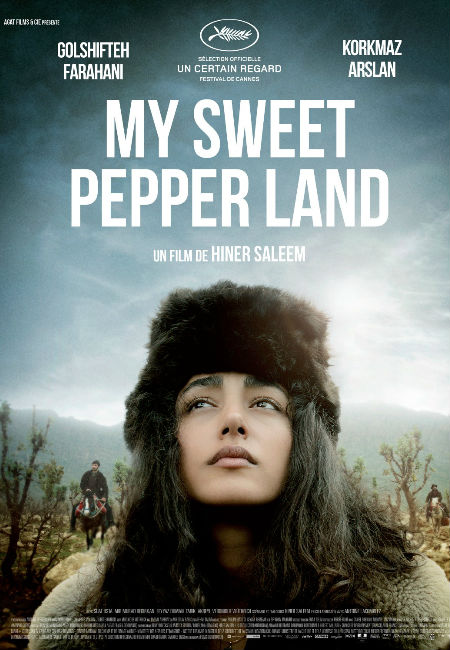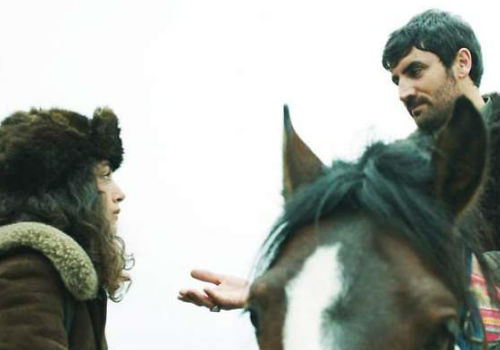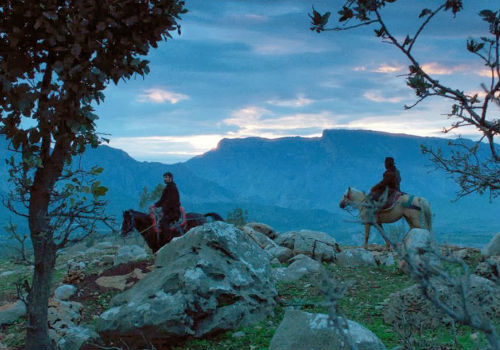
It could be said, in what is admittedly a gross simplification, that the world is divided into two diametrically opposed groups – aspiring idealists who believe they can make a real difference to the world in which they live, and cynical pragmatists who see no hope for society’s redemption, and simply make the best of a bad situation.
Kurdish director Hiner Saleem brings these two polar opposites together to great effect in his new film My Sweet Pepperland, which deftly mixes the grim yet hopeful political realities of trying to forge a new society in northern Iraq in the aftermath of the war to topple Saddam Hussein, with age-old social proprieties, power struggles, and the odd Elvis tune or two.
Unexpectedly channeling the spirit of old Clint Eastwood Westerns, where the lone idealistic hero often stood bravely and resolutely against the full force of the established, often corrupt order, Saleem brings the semi-ordered chaos of Iraqi Kurdistan to life in all its bizarre and yet engaging complexities.
Here, in a land where those who inherited the mantle of leadership are struggling to work out what form this brave new world of theirs should take – one without many of the apparatus that we take for granted such as a fully functioning judicial system or jail, leading to the darkly0humoured, farcically-botched hanging scene that ushers in the film – men like ex-resistance fighter and now policeman, Baran (Korkmaz Aslan) are doing to their best to give their idealistic principles flesh and blood reality.

So too is single school teacher Govend (Golshifteh Farahani, who has presence to burn) who journeys to Qamarian on the border with Turkey, the small two phone town that Baran, seeking a quieter life, has been posted to, in order to make sure that the next generation are educated and given as full a chance as possible to be a part of this new Kurdistan, whatever form it takes.
Alas, for all their idealism and good intentions, the town is not forgiving enough to let them simply get on with it, and they find themselves, both individually and later together as a slow burning friendship and then romance develops between them, facing off against the old order which takes the form of local warlord Aziz Aga (Tarik Akreyî) who has made quite a success of playing off every side in the conflict to his own benefit, and is used to getting his own way.
Needless to say, he does not take kindly to either Baran’s stubborn adherence to the rule of law and his willingness to back that up with force as needed, or Govend’s refusal to simply pack up and leave when Aziz Aga’s goons, led by Tajdin (Mir Murad Bedirxan), decree she is a “slut” and must go (the sleazy campaign to malign her is based on gossip and innuendo and nothing else).
The Mexican standoff which then develops, rendered with as much surreal humour as gritty realpolitik and brutal violence by Saleem, forms the dramatic backbone of My Sweet Pepperland, which presents a beguiling and beautiful Kurdistan – the cinematography by Pascal Auffray is simply stunning, giving the land both allure and menace all at once – as well as one riven by ugly, old historical realities.

Its this marriage of delightful farce – the scene where Govend’s over-protective horde of brothers won’t let their fiercely independent sister out of their sight is priceless, as are constant visual references to the gallery of former dead police chiefs, all victims of Aziz Aga’s brutal rule – and drama that makes the film, named after the rough-and ready bar that is the centre of town life, such a compelling viewing experience.
You are left in no doubt that a war still wages between the conservative old forces whose only concern is the maintenance of their stranglehold on power and the money and status it affords them – in Aziz Aga’s case from smuggling drugs and arms into Turkey and Iran, which earns him the ire of an all-female Kurdish resistance unit who are woefully under-used in the film’s only weak spot – and the new guard represented by the piercing resolute eyes of Baran and the gutsy tenacity of Govend.
There is no happy ending promised of course since these kinds of cultural and political battles rarely end in happily-ever-after moments, usually settling into simmering guerilla skirmishes that benefit no one, least of all the society in which they take place, but Baran and Govend are determined to what they can, for as long as they can, to bring about whatever change is possible.
The ambiguous ending reflects this agonising limbo between the idealistic new and the cynical old to perfection, acknowledging that while gains might be made, that there will be losses too.
For all its embracing of the harsh realities of life on the ground, My Sweet Pepperland impressively never loses its sense of humour, its hankering for visual slapstick of a sort, and even its whimsical sense of the surreality with Baran’s love of “Elvis, Johann Sebastien Bach and Mozart” providing a jaunty soundtrack to a movie that by rights should be weighed down by the largely intransigent nature of the society in which it takes place.
Thanks to Saleem’s well-judged eye for balancing the theatre of the absurd with an appreciation of the realpolitik and cultural conservatism that anchors most societies, My Sweet Pepperland emerges as an engagingly vivid representation of a society caught in transition, unsure of whether to move forward with the idealists or stick with the devil it knows.